Papers by Özden Melis Uluğ

European Journal of Social Psychology
Research on system justification theory has found that ideological justification of the status qu... more Research on system justification theory has found that ideological justification of the status quo is associated with increased positive emotion and decreased negative emotion and, consequently, a lack of support for system‐challenging protest. However, almost all of this research has been conducted in “WEIRD” (Western, Educated, Industrialized, Rich, Democratic) countries. Here we investigated the role of system‐level emotions in mediating the negative association between system justification and collective action in the authoritarian political context of Turkey. We hypothesized that system justification would be associated with opposition to system‐challenging collective action, and the association would be mediated by system‐level emotions, even after adjusting for individual‐ and group‐level emotions. These hypotheses were investigated in studies involving university students (Study 1, N = 132) and two community samples recruited during the Gezi Park protests of 2013 (Study 2, N...
Feminism & Psychology, Jul 25, 2022

British Journal of Social Psychology, Nov 1, 2021
Previous research indicates that trust in the political system increases well‐being. Drawing from... more Previous research indicates that trust in the political system increases well‐being. Drawing from prior collective action research, we posit that a) the relationship between political trust and well‐being would be mediated by collective action participation (mediation hypothesis) and b) political efficacy would moderate the indirect effect of political trust on well‐being through collective action participation (moderated mediation hypothesis). In two studies (N = 704), we tested these relationships among opposition voters in Turkey before two highly contested elections. The findings of Study 1 showed a significant indirect effect of political trust on well‐being through collective action participation and supported our mediation hypothesis. However, unlike democratic contexts, the relationship between collective action and well‐being was negative. In addition, we did not find support for our moderated mediation hypothesis. In Study 2, we used more nuanced measures of political efficacy (voting efficacy and online/offline protest efficacy) and collective action (both offline and online collective action). In addition to replicating the findings of Study 1 with respect to the mediatory role of collective action participation (but only for online collective action participation), Study 2 again did not support our moderated mediation hypotheses with respect to the four moderators. Results highlight the importance of online and offline collective action among ideologically marginalized people with low trust in the political system in maintaining well‐being.
Social Psychological Review
Social Psychological Review

British Journal of Social Psychology
While public health crises such as the coronavirus pandemic transcend national borders, practical... more While public health crises such as the coronavirus pandemic transcend national borders, practical efforts to combat them are often instantiated at the national level. Thus, national group identities may play key roles in shaping compliance with and support for preventative measures (e.g., hygiene and lockdowns). Using data from 25,159 participants across representative samples from 21 nations, we investigated how different modalities of ingroup identification (attachment and glorification) are linked with reactions to the coronavirus pandemic (compliance and support for lockdown restrictions). We also examined the extent to which the associations of attachment and glorification with responses to the coronavirus pandemic are mediated through trust in information about the coronavirus pandemic from scientific and government sources. Multilevel models suggested that attachment, but not glorification, was associated with increased trust in science and compliance with federal COVID‐19 gu...

Journal of Social Issues
The World Health Organization (WHO) identified +65 individuals as one of the most vulnerable popu... more The World Health Organization (WHO) identified +65 individuals as one of the most vulnerable populations in the current pandemic. Previous research has shown a robust association between ageism and derogatory attitudes and behaviors targeting older people. We proposed that reluctance of people under age 65 to endorse the policies that benefit older adults can be further explained by their adherence to social Darwinism. We tested a mediation model to examine whether social Darwinism would predict support for policies directly and indirectly through the endorsement of ageist attitudes. We conducted two correlational studies in Turkey (Study 1; N = 1261) and the United States (Study 2; N = 210). In Study 1, we collected data through social media and messaging platforms in April 2020. In Study 2, participants were recruited via Prolific Academic in May 2020. In both studies, we found that adherence to social Darwinist beliefs negatively predicted support for policies. We also found that...
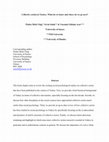
Examining Complex Intergroup Relations
This book chapter aims to review the existing social psychological studies on collective action t... more This book chapter aims to review the existing social psychological studies on collective action that have been published in the context of Turkey. First, we provide a brief historical background of Turkey in terms of collective movements, especially focusing on the last decade. Second, we discuss how other disciplines in the social sciences have approached collective action much earlier than social psychology. Third, we provide an up-to-date review of how collective action has been studied in social psychology in Turkey by specifically focusing on the a) antecedents and dynamics of and b) outcomes of collective action. Finally, we discuss future directions stemming and highlight in which areas more collective action research is needed in Turkey in particular and in authoritarian contexts in general. We discuss the importance of context when COLLECTIVE ACTION AND SOCIAL CHANGE IN TURKEY 2 research is conducted in a non-WEIRD environment, in a country where the typical antecedents and outcomes of collective action may not be in place. Thus, we aim to add to the existing global literature by discussing areas where the research based in Turkey is similar to yet diverges from the existing literature.
Cultural Diversity and Ethnic Minority Psychology
Article (Accepted Version) http://sro.sussex.ac.uk Uluğ, Özden Melis and Uysal, Mete Sefa (2021) ... more Article (Accepted Version) http://sro.sussex.ac.uk Uluğ, Özden Melis and Uysal, Mete Sefa (2021) The role of ethnic identification, allyship, and conflict narratives in supporting pro-minority policies among majority and minority groups. Cultural Diversity and Ethnic Minority Psychology.

Türk psikoloji yazıları, 2017
Şehir isyanlarıyla ilgili uluslararası alanyazın Gezi Parkı eylemlerini anlamak için önemli bir ç... more Şehir isyanlarıyla ilgili uluslararası alanyazın Gezi Parkı eylemlerini anlamak için önemli bir çerçeve sunmaktadır (örn., Drury ve Reicher, 2005). Haksızlık algısı, haksızlığın ancak eylem yoluyla ortadan kaldırılacağının düşünülme-si, eylemler sırasında ortak bir kimliğin inşa edilmesi ve kolektifin gücüne güven duymayı içeren isyanın bileşenleri bu çalışmalarda ortaya konulmuştur. Bunun yanında, şehir isyanlarının geçtiği dört aşama (kalabalığın toplanması, dış-grubun müdahalesiyle ortak kimlik altında birleşmesi, dış-grupla gerginliğin tırmanışı ve kalabalığın eylemlerden güçlenerek çıkması) yine bu çalışmalarda gösterilmiştir. Bu araştırmada, hem kendini aktivist olarak görmeyen kişilerin eylemlere katılma motivasyonunu ve isyanı nasıl anlamlandırdığını betimlemek hedeflenmiş, hem de katılımcıların anlatılarından yola çıkarak uluslararası alanyazınla Gezi Parkı isyanının benzerlikleri ve farklılıkları ortaya konulmak istenmiştir. Bu amaçla isyana katılan 13 kişiyle derinlemesine mülakatlar gerçekleştirilmiştir. Katılımcılara protestolara katılma gerekçeleri, eylemler sırasındaki deneyimleri ve eylemlerin sonuçlarını nasıl değerlendirdikleri sorulmuştur. Analiz sonuçlarına göre, bir süredir Türkiye'de gerçekleştirilen uygulamalar, katılımcıları " artık yeter " deme noktasına getirmiştir. Parktaki ağaçların kesilmesi " bardağı taşıran son damla " olarak anlatılmıştır (haksızlık algısı). Bir süredir " sineye çekilenlere " artık dur deme isteği ifade edilmiştir (haksızlığı eylem yoluyla ortadan kaldırma isteği). Parkta bulunmak, isyanın bir parçası olmak, kurulan ortak kimliğin (Gezi direnişçisi) bir üyesi olmak, eylemlere katılmaya devam etmenin nedenleri olarak açıklanmıştır. Katılımcılar gelecekte başka isyanların da olabileceğini düşünmüş ve umutla dolmuştur (kolektife duyulan güven). İsyanın bileşenleriyle ve geçtiği aşamalarla ilgili bulgular, hem alan-yazınla benzerlikler ve farklılıklar üzerinden tartışılmış, hem de Gezi isyanının sosyal psikolojik bir yaklaşımla ele alınmasının gerekliliği çerçevesinde değerlendirilmiştir.
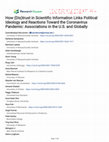
U.S.-based research suggests conservatism is linked with less concern about contracting coronavir... more U.S.-based research suggests conservatism is linked with less concern about contracting coronavirus and less preventative behaviors to avoid infection. Here, we investigate whether these tendencies are partly attributable to distrust in scientific information, and evaluate whether they generalize outside the U.S., using public data and recruited representative samples across four studies (Ntotal=37,790). In Studies 1–3, we examine these relationships in the U.S., yielding converging evidence for a sequential indirect effect of conservatism on compliance through scientific (dis)trust and infection concern. In Study 4, we compare these relationships across 19 distinct countries, finding that they are strongest in North America, extend to support for lockdown restrictions, and that the indirect effects do not fully appear in any other country in our sample other than Indonesia. These effects suggest that rather than a general distrust in science, whether or not conservatism predicts co...
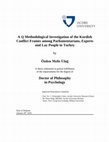
Many societies in different parts of the world have witnessed intractable conflicts. People livin... more Many societies in different parts of the world have witnessed intractable conflicts. People living in these societies construct conflict frames to understand the ongoing conflicts. Based on Lederach’s (1999) pyramid approach to peace building, the current study investigates how people understand the Kurdish conflict in Turkey in three segments of society: a) politicians, b) scholars and journalists and c) lay people. The Kurdish conflict was approached based on the frame analysis of Entman (1993), which includes four domains: a) problem definition, b) causal interpretation, c) moral evaluation, and d) treatment recommendation. In a first phase, focus group discussions and open-ended questionnaires were used to explore alternative conflict understandings among lay people. In a second phase, Q methodology, a method suitable to uncover socially shared viewpoints, was used to understand the conflict frames of parliamentarians, experts and lay people. In a third phase, after analyzing ea...

International Journal of Communication, 2020
This contribution examines a case of collective action in Turkey against a sexist advertisement. ... more This contribution examines a case of collective action in Turkey against a sexist advertisement. Protests unfolded exclusively through social media and resulted in more than 20,000 protestors signing a petition against the ad. In this study, we examine protest motivations behind the case and study the degree with which these motivations are explained by (1) online/offline action practices, and (2) three social-psychological variables (social identity, perceived efficacy, and just-world beliefs). Survey data from 353 participants were analyzed by means of hierarchical linear regression. Results indicated that protestors were mobilized by their identification with women’s rights defenders, their perceptions of collective efficacy and both offline and online action practices. In addition, just-world beliefs were negatively associated with collective action. Our findings confirm and expand recent findings of the relevance of social-psychological predictors for collective action in the o...
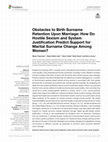
Frontiers in Psychology, 2021
Despite the ongoing shift in societal norms and gender-discriminatory practices toward more equal... more Despite the ongoing shift in societal norms and gender-discriminatory practices toward more equality, many heterosexual women worldwide, including in many Western societies, choose to replace their birth surname with the family name of their spouse upon marriage. Previous research has demonstrated that the adherence to sexist ideologies (i.e., a system of discriminatory gender-based beliefs) among women is associated with their greater endorsement of practices and policies that maintain gender inequality. By integrating the ideas from the system justification theory and the ambivalent sexism theory, we proposed that the more women adhere to hostile and benevolent sexist beliefs, the more likely they would be to justify existing gender relations in society, which in turn, would positively predict their support for traditional, husband-centered marital surname change. We further argued that hostile (as compared to benevolent) sexism could act as a particularly strong direct predictor ...
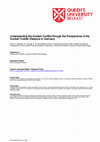
Peace and Conflict: Journal of Peace Psychology, 2020
Understanding the Kurdish Conflict through the Perspectives of the Kurdish-Turkish Diaspora in Ge... more Understanding the Kurdish Conflict through the Perspectives of the Kurdish-Turkish Diaspora in Germany The perspectives of lay people within conflict settings are important because the ways in which they perceive and understand ongoing conflict can shape its course. While limited, existing research suggests that diaspora communities can also play a pivotal role in influencing conflict from outside their homeland; however, systematic examination of the different ways that members of diaspora communities frame conflict occurring within their homelands has not received attention. Using Entman's (1993) systematic frames analysis, research by Uluğ and Cohrs's (2016) examined conflict frames used by lay people from different ethnic groups in Turkey. The current research replicates and extends this work by examining conflict frames used by members of the Kurdish-Turkish diaspora in Germany following the same frame analysis: a) problem definitions, b) sources of the problem, c) moral evaluations, d) solutions to the problem, and e) barriers to the solution of the problem. Q methodology, a mixed-methods approach, was used to discover socially shared viewpoints regarding the Kurdish conflict with 43 people from the Kurdish and Turkish diaspora in Germany. Results highlighted four different conflict frames, labeled as a) a freedom for Öcalan frame; b) a nation-state ideology and democracy frame; c) an independence and identity for Kurds frame; and d) a terrorism, economy, and foreign power frame. These diverse viewpoints are evidence of the importance of emphasizing the role of diaspora groups' perspectives in conflict resolution and peace process. The article concludes with a discussion of similarities and differences across lay people in Turkey and diasporic communities in Germany.











Uploads
Papers by Özden Melis Uluğ
Direnişte yer alan grupların motivasyonlarını anlamanın yanı sıra her grubun diğer grup veya grupları nasıl gördüğünü ve isyan sürecinde birbirlerini nasıl algıladıklarını öğrenmemize yardımcı olan bu çalışma, bambaşka hayatların verdiği bambaşka cevaplara ayna tutarak ufkumuzu da, dünyamızı da genişletiyor ve zenginleştiriyor.Farklı çevre ve grupların gelecekle ilgili beklentilerini ve onların bu protestoları Türkiye için bir dönüm noktası olarak görüp görmediğini okura aktarmak kitabın amaçları arasında… Gezi Direnişi'nin gelecekte olabilecek yeni direnişlere de ışık tutacağı düşüncesi de bir leitmotif olarak satırlar arasından süzülüp karşımıza çıkıyor. Alevilerden Anti-kapitalist Müslümanlara, Devrimci Müslümanlardan Feminist Kadınlara, Kemalistlerden Kürtlere, LGBTİ'lerden Ülkücülere, sosyalist partilerden sendikalara, Taksim Dayanışması'ndan Çarşı'ya büyük bir çeşitliliğin damgasını vurduğu direnişin birinci elden hikâyesi…